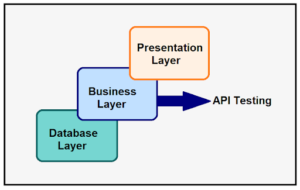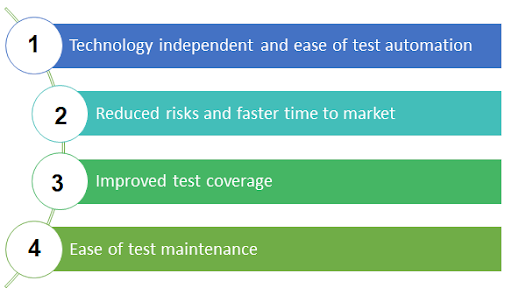Accelerate Success with AI-Powered Test Automation – Smarter, Faster, Flawless
Start free trialAn application programming interface (API) is a computing interface that defines interactions between multiple software intermediaries. It defines the kinds of calls or requests that can be made, how to make them, the data formats that should be used, the conventions to follow, etc. (Source: Wikipedia)
API’s help not only in abstracting the underlying implementation but also improves the modularity and scalability of software applications. APIs encompass the business and functional logic and are a gateway to sensitive data and expose only objects & actions that are needed.
API testing deals with testing the business logic of an application, which is typically encompassed in the business layer and is instrumental in handling all the transactions between the user interface and underlying data. It is deemed as a part of Integration testing that involves verification of functionality, performance, and robustness of APIs.

Besides checking for the functionality, API testing also tests for error condition handling, response handling in terms of time and data, performance issues, security issues, etc.
API testing also deals with contract testing, which in simpler terms, is verifying the compatibility and interactions between different services. The contract is between a client/consumer and API/service provider.
Clearly, API’s usage is not limited to just one application and in some cases, they can be used across many applications and are also used for third party integrations. Hence, developing and testing them thoroughly is extremely critical.
The following section highlights the top benefits of API Testing
What are the top benefits of API testing

These benefits are discussed in detail below.
Technology independent and ease of test automation

- The API’s exchange data in structured format via XML or JSON. This exchange is an independent coding language, thus giving the flexibility to choose any language for test automation.
- API testing can be effectively automated because the endpoints and request parameters are less likely to change, unless there is a major change in business logic. Automation reduces manual efforts during regression testing and results in a significant amount of time-saving.
- API tests require less scripting efforts as compared to GUI automated tests. As a result, the testing process is faster with better coverage. This culminates in time and resource-saving. Overall, it translates into the reduced project costs.
Reduced risks and faster time to market

- API testing need not be dependent on GUI and other sub-modules. It can be conducted independently at an earlier stage to check the core business logic. Issues, if any, can be reported back for immediate action without waiting for others to complete.
- APIs represent specific business logic, it is easier for the teams to isolate the buggy module and rectify it. The bugs reported early can be fixed and retested, independently yet again. This reduces the quantum of time taken between builds and release cycles, resulting in faster releasing of products.
- The amount and variety of input data combinations inadvertently lead to testing limit conditions, which otherwise may not be identified/tested. This exposes vulnerabilities, if any, at an earlier stage even before GUI has been developed. These vulnerabilities can be then rectified on a priority basis and any potential loophole for breaches is handled.
- When there are multiple API’s from different sources involved in development of an application, the interface handshake may or may not be firm. API testing deep dives into these integration challenges and handles them at earlier stages. This ensures that end user experience is not affected because of the issues that could have been handled at API level.
How API Testing helps Improved test coverage?

API test automation helps in covering a high number of test cases, functional and non-functional. Also, for a complete scenario check API testing requires to run both, positive and negative tests. Since API testing is a data-driven approach, various combinations of data inputs can be used to test such test cases. This gives good test coverage overall.
Good test coverage helps in identifying and managing defects in a larger scenario. As a result, miniscule bugs make way to production, thus resulting in a higher quality product.
How API Testing Eases Test Maintenance?

- API tests are usually deemed stable and major changes are done mainly when business logic is changed. The frequency and amount of changes are comparatively less. This means less rework in rewriting test cases in event of any changes. This is in sharp contrast to GUI testing, which requires rework at many levels in case of any changes.
- API tests can be reused during testing, thus, reducing the overall time quantum required for testing.
Also, it is a good idea to categorize the test cases for better test case management since the number of API’s involved in any application can be large. We have talked about this in our earlier blog “Do’s and Don’ts of API testing”.
Conclusion
APIs evolve and develop as and when business and functional requirements change, thus making it even more important to test them on a continuous basis.
Webomates test APIs using Manual and Automation testing. Webomates provides API testing which focuses on Performance and Security Testing to make sure the application is secure and giving the application a strong backbone.
You can take a quick look at the following table to see which tools are already integrated in our Testing as a Service platform.
| Manual API testing | Automated API Testing |
| Postman | Jersey RESTful Web Services |
| Rest Assured | POSTMAN |
| Swagger | Rest Assured |
| JMeter | JMeter |
| Any REST client or dev tool | Swagger |
| API Fortress |
At Webomates, we continuously work to evolve our platform and processes in order to provide guaranteed execution, which takes testing experience to an entirely different level, thus ensuring a higher degree of customer satisfaction.
Webomates offers regression testing as a service that is a combination of test cases based testing and exploratory testing. Test cases based testing establishes a baseline and uses a multi-execution channel approach, to reach true pass / true fail, using AI Automation, automation, manual, and crowdsourcing. Exploratory testing expands the scope of the test to take the quality to the next level. Service is guaranteed to do both and even covers updating test cases of modified features during execution in 24 hours.
If you are interested in learning more about Webomates’ CQ service please click here and schedule a demo, or reach out to us at info@webomates.com
You can also try our AI Test Automation platform – Webo.AI
Tags: API Testing, Postman, REST API, Swagger

Leave a Reply